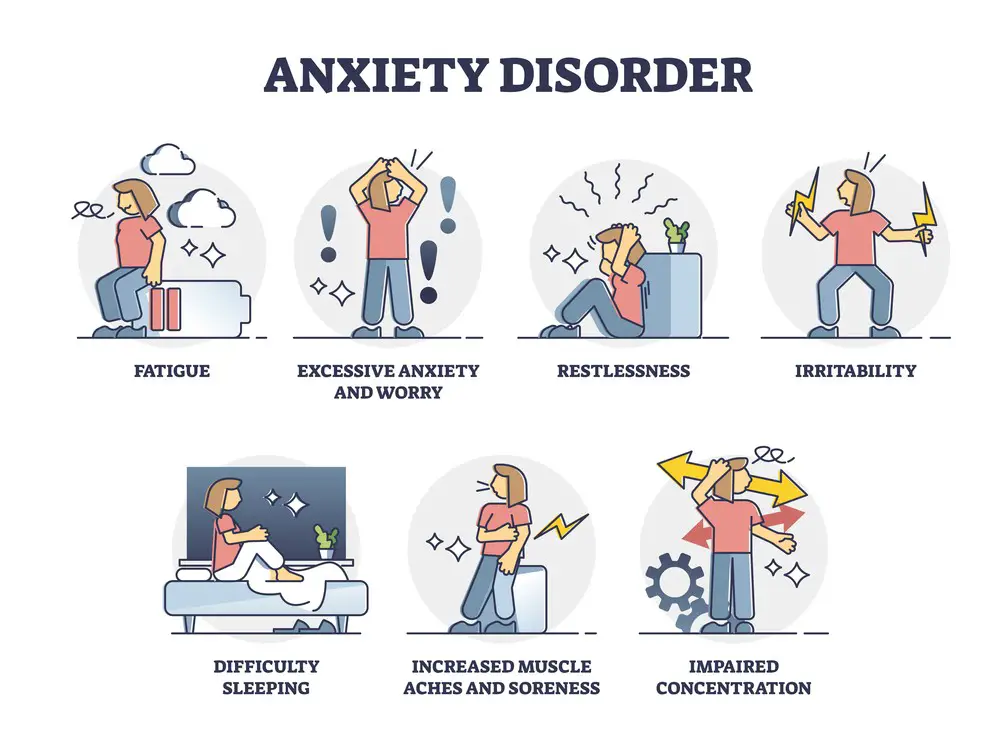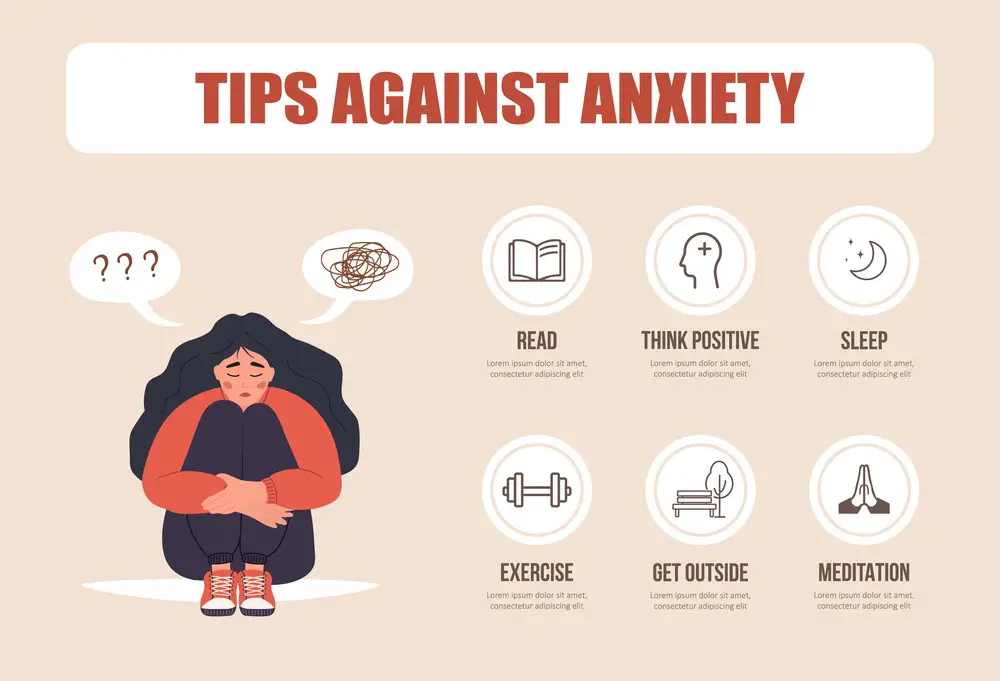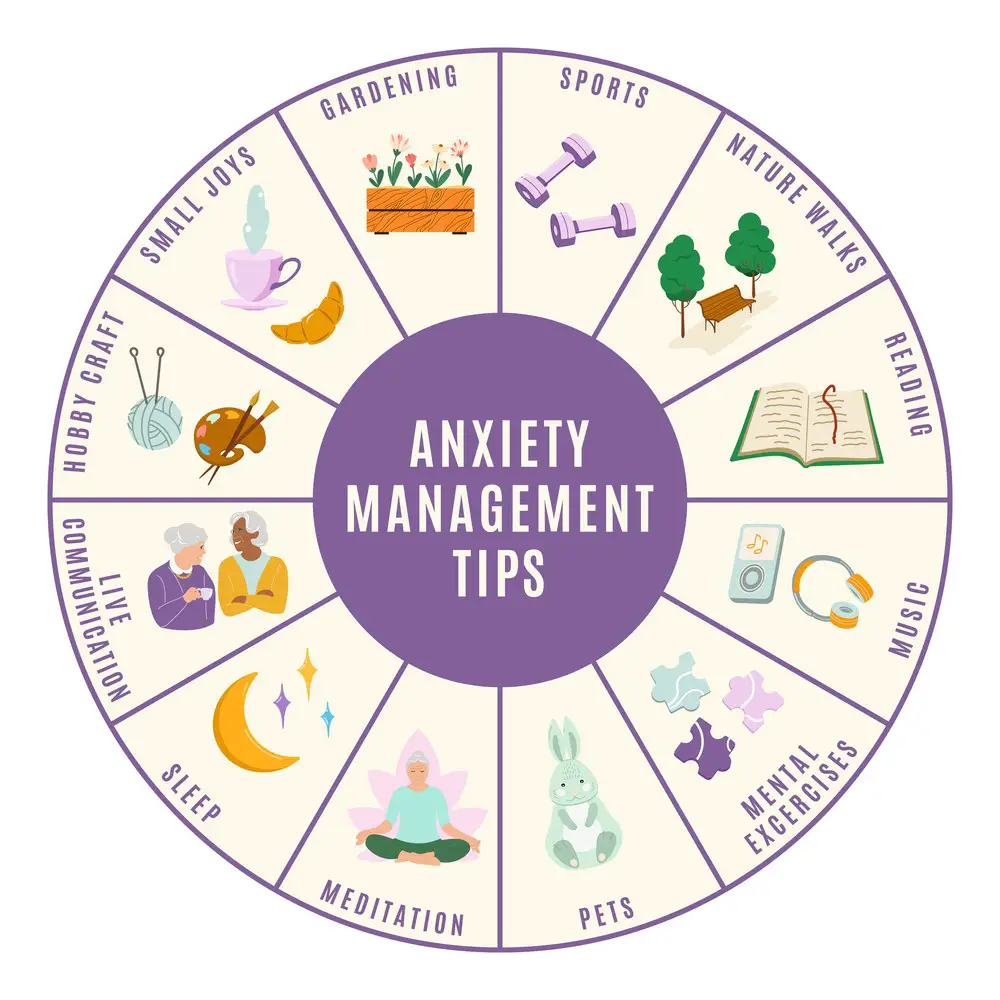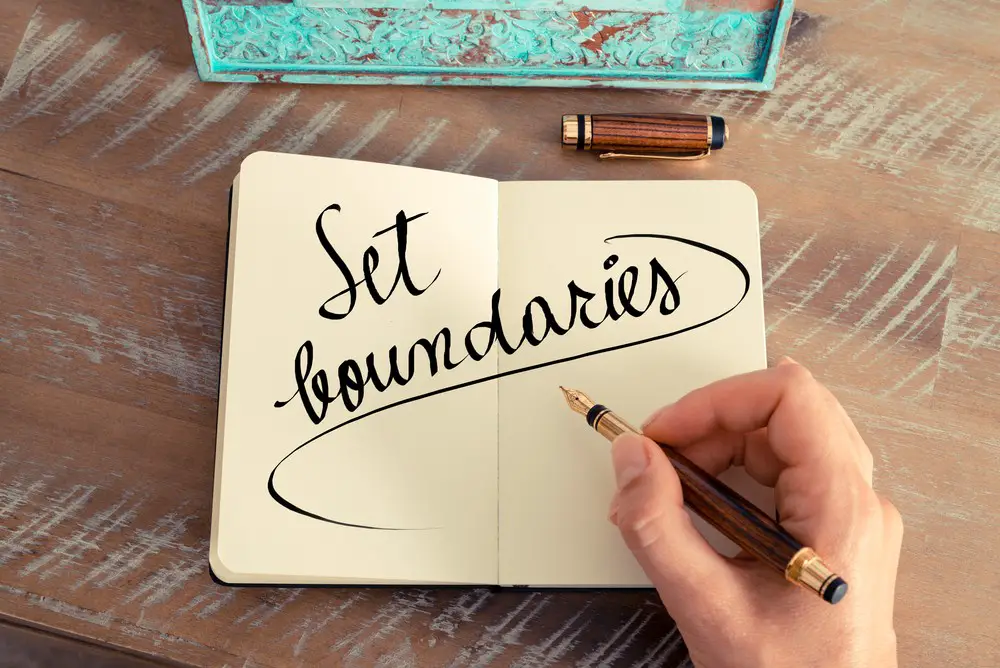As a BetterHelp affiliate, we receive compensation from BetterHelp if you purchase products or services through the links provided
Post-argument anxiety can leave individuals feeling uneasy, unsettled, and anxious after a heated argument. This common phenomenon can result from worry about the conflict’s outcome or a lingering regret for not doing one’s best during the disagreement. The anxiety can manifest through physical symptoms like a racing heart, sweating, and difficulty breathing, making it crucial to understand its causes and impacts on relationships.
Arguments are inevitable in human interactions, but knowing how to deal with the aftermath effectively is essential for maintaining healthy relationships and personal well-being. Sometimes, the argument can trigger a “fight or flight” response, emphasizing the need for thoughtful strategies to navigate post-argument anxiety. By identifying deeper issues, learning from mistakes, and finding a balance, individuals can minimize the negative effects on their lives and the relationships they cherish.
Key Takeaways
- Post-argument anxiety is a common feeling of unease experienced after conflicts, impacting personal well-being and relationships.
- Understanding the causes, triggers, and potential impacts is crucial for finding effective strategies to deal with post-argument anxiety.
- Recognizing deeper issues, learning from mistakes, and establishing balance can significantly improve how individuals handle conflicts and anxiety.
 Understanding Post-Argument Anxiety
Understanding Post-Argument Anxiety
We all experience arguments, and it’s normal for them to leave us feeling stressed, anxious, or upset. Post-argument anxiety is the lingering sense of unease that follows a heated discussion or disagreement. This form of anxiety can manifest in various ways – from mild discomfort to more severe physical symptoms like a racing heart, sweating, and difficulty breathing.
Post-argument anxiety is closely related to stress and mental health. While some anxiety is natural after a disagreement, ongoing post-argument anxiety could indicate underlying issues such as depression or fear. It’s important to acknowledge these feelings and work towards addressing them for our overall well-being.
Here are some ways to cope with post-argument anxiety:
- Take a break: Distance yourself from the situation, even briefly, to allow for a clearer perspective and a chance to regroup.
- Practice self-compassion: It’s OK to feel unsettled after an argument. Recognize that it’s natural to feel this way and will pass over time.
- Reflect on the argument: Evaluate the points made during the argument and consider if there’s anything to learn or improve on for future communication.
- Communicate openly: Honest communication is key to resolving conflicts and alleviating anxiety. Reach out to the person involved in the argument to express your feelings and work towards a resolution.
We can also cultivate habits to reduce the likelihood of experiencing post-argument anxiety:
- Be mindful of our emotional triggers: Knowing what sets us off can help us avoid escalating a disagreement into an argument.
- Focus on active listening: Strive to understand the other person’s perspective instead of just trying to get our point across.
- Stay solution-oriented: Aim to find common ground and seek resolutions rather than dwelling on who is right or wrong.
Understanding and managing post-argument anxiety can protect our mental health and cultivate stronger, more resilient relationships. Remember, feeling anxious after an argument is okay, but addressing the anxiety will help us bounce back and maintain overall well-being.
Causes and Triggers
Post-argument anxiety can have several causes and triggers, varying from person to person. We will discuss some common factors that might contribute to this unwelcome feeling.
Arguments and disagreements can be emotionally draining, especially involving close friends or loved ones. The heat of the moment may lead us to say hurtful things we don’t mean, exposing underlying issues in the relationship. After the argument, we might feel anxious, replaying the conversation in our minds and questioning our actions and words.
Poor communication and listening skills can also contribute to post-argument anxiety. When both parties aren’t genuinely hearing each other out, it can create misunderstandings, leading to a cycle of arguments and unresolved issues. Becoming aware of our listening habits and striving to improve them can help reduce post-argument anxiety.
Demands and ultimatums put additional stress on us during arguments. Faced with these pressures, we may feel cornered and make rash decisions, followed by anxiety, wondering if we made the right choice.
Threats in arguments can induce fear and anxiety, making us feel vulnerable and unsafe. This emotional turmoil can last long after the disagreement, making it difficult to move on and find common ground.
Several external triggers can induce or exacerbate post-argument anxiety, such as:
- Personal stress: If we’re already experiencing external stress, it’s more likely that an argument will trigger anxiety in us.
- Sleep deprivation: Not getting enough rest can affect our emotional resilience, causing us to react negatively to disagreements and feel more anxious afterward.
- Substance use: Consuming alcohol or drugs can intensify emotions during arguments, leading to heightened anxiety afterward.
It is essential to recognize our anxiety triggers so that we can create strategies to manage them more effectively. By understanding the factors contributing to our post-argument anxiety, we can take steps to reduce its impact on our emotional well-being and relationships.
 The Impact on Relationships
The Impact on Relationships
Experiencing post-argument anxiety can have several consequences on our relationships. How we communicate with our partners is crucial to maintaining a healthy connection. When anxiety arises after an argument, it can lead to:
- Misunderstandings: Anxiety may cause us to misinterpret our partner’s words or actions, leading to further disconnection.
- Avoidance: As a result of anxiety, we might avoid discussing important issues, thereby preventing resolution and growth.
- Emotional distance: Anxiety can create a barrier between partners, weakening emotional bonds and making it more difficult to support one another.
Being aware of these potential impacts can help us take steps to reduce the negative effects of post-argument anxiety. Here are some tips to work through conflicts more constructively and maintain a strong connection with our partner:
- Prioritize open communication: Ensure both partners express their feelings and thoughts calmly and respectfully. Establish a safe environment to discuss difficult topics.
- Acknowledge your partner’s perspective: Validate your partner’s emotions and try to understand their viewpoint, even if you may not agree with it.
- Take breaks, if necessary: If the conversation becomes too heated or overwhelming, take a break and return to the discussion when both partners feel calmer.
- Communicate your needs and boundaries: Let your partner know when you need extra support, and don’t hesitate to set boundaries if the conversation becomes counterproductive.
- Practice empathy and forgiveness: Remember that both partners in a relationship are human and may make mistakes. Being understanding and forgiving can help rebuild trust, even after an argument.
Implementing these strategies can help us manage post-argument anxiety more effectively and promote healthier communication within our relationships. This can strengthen our emotional bonds and interpersonal connections with our partners, ultimately helping maintain more fulfilling relationships.
 Role of Social Media and Arguments
Role of Social Media and Arguments
Social media has become an integral part of our lives, and it’s not uncommon to encounter disagreements and arguments on these platforms. The nature of social media can sometimes amplify such conflicts and contribute to post-argument anxiety. Let’s examine the relationship between social media, disagreements, and arguments.
One aspect of social media is that it can provide anonymity or a sense of distance between users. This can lead to a more confrontational communication style among users, escalating disagreements or arguments faster than in face-to-face conversations. Additionally, the written communication format on social media might not convey the same emotional nuances as verbal or in-person interactions, leading to misunderstandings and increased tension.
Moreover, the public nature of social media allows bystanders to view or even join in on arguments. This can add extra pressure and anxiety, as no one wants to feel criticized or judged by others. We tend to seek approval from our peers, and the fear of disapproval or negative reactions can contribute to post-argument anxiety.
Here are some suggestions for managing social media-related anxiety and conflicts:
- Remain mindful of the limitations of written communication and try to consider the larger context before responding to potentially argument-provoking content to avoid misunderstandings.
- Endeavor to express your thoughts or opinions respectfully and kindly, even when in disagreement. This can help create a more constructive dialogue and reduce the chances of arguments escalating.
- Try not to take social media arguments too personally. Remember that people may speak more forcefully or exhibit hostility due to anonymity and distance.
- Consider taking a break from social media when feeling overwhelmed or anxious after a disagreement. This can provide an opportunity to decompress, reflect, and come back with a clearer mind.
By being mindful of social media’s role in our communication and potential conflicts, we can improve our online interactions and mitigate the impact of post-argument anxiety.
 Dealing with Post Argument Anxiety
Dealing with Post Argument Anxiety
We all know arguments with loved ones can be distressing, and dealing with the aftermath may often lead to post-argument anxiety. Let’s discuss ways to cope with this anxiety and reinstate a sense of balance after heated disputes.
First, it’s important to give ourselves space to cool off. After an argument, emotions are high, so we must take some time away from the situation to catch our breath. Doing so allows us to gather our thoughts and regain composure.
Once we’ve calmed down, reconnecting with the person we argued with is the next step. This might involve apologizing or listening to their perspective. We can begin mending any damage caused during the dispute by openly and honestly communicating.
It’s also vital to approach the situation with compassion. We should remind ourselves that everyone makes mistakes and that our emotions may sometimes get the better of us. Recognizing that the other person also has feelings helps to foster empathy and understanding.
There are various coping mechanisms we can use when dealing with post-argument anxiety:
- Practicing deep breathing exercises to manage stress
- Engaging in self-care activities such as taking a bath or going for a walk
- Seeking support from friends or family members to help process our emotions
In addition to these coping strategies, making up with the person we argued with can be crucial in overcoming anxiety. Make-up sex, for instance, can sometimes provide physical closeness and emotional intimacy, helping to dissipate lingering tension or negative feelings.
Ultimately, the key to dealing with post-argument anxiety lies in our ability to address the matter openly and honestly. By taking time to cool off, reconnect, and employ the suggested coping mechanisms, we can foster a healthier and more understanding environment where conflicts can be resolved more effectively.
 Identifying Deeper Issues
Identifying Deeper Issues
Regarding post-argument anxiety, we must delve deeper and identify any underlying issues that might have contributed to the disagreement. By recognizing these deeper issues, we can address the root causes and prevent further resentment from building up. We can also restore the connection between ourselves and the other person involved. Here are a few tips to help identify these issues:
First, let’s step back and reflect on our feelings during the argument. Were we feeling frustrated, unheard, or disrespected? These emotions often point to more profound issues that need to be addressed. We should take note of these feelings and explore their origins.
Next, we should look for any patterns in our arguments. Are there recurring themes or topics? If so, these can signify deeper issues or unresolved conflict. It’s crucial to acknowledge these patterns and work toward resolving them.
It’s also important for us to examine our fusion level with our partner or the person we argued with. Fusion refers to the extent to which we see ourselves as separate entities or as intertwined with the other person. When highly fused, accepting differing viewpoints or beliefs can be difficult, leading to arguments and disconnection.
Here are some additional strategies to help with identifying deeper issues:
- Discuss the argument with a trusted friend or therapist. Sometimes, an outside perspective can help us see things more clearly.
- Practice mindfulness and self-awareness, allowing us to be more in tune with our emotions, reactions, and relationship patterns.
- Keep a journal to track conflicts, feelings, and observations. This can help clarify underlying issues and patterns over time.
Identifying deeper issues is essential in overcoming post-argument anxiety and fostering stronger connections with others. By addressing these underlying problems and working to resolve them, we can reduce future conflicts and cultivate healthier relationships.
 Therapy and Treatment Options
Therapy and Treatment Options
Therapy and various treatment options can be quite helpful when dealing with post-argument anxiety. We recommend considering professional help and self-help strategies to ease anxiety after intense disagreements.
One of the primary treatment options is psychotherapy. This involves talking with a mental health professional, such as a psychologist or therapist, who can guide you in better understanding your anxiety and discovering ways to manage it. Cognitive Behavioral Therapy (CBT) is a common form of psychotherapy often utilized for treating anxiety disorders, focusing on identifying and changing negative thought patterns and behaviors.
Here are a few therapy-related tips to consider when addressing post-argument anxiety:
- Look for a licensed mental health professional with experience in treating anxiety disorders.
- Be patient and give both yourself and the therapy process time to work.
- Maintain an open and honest line of communication with your therapist throughout your sessions.
Another essential element in coping with post-argument anxiety is self-help strategies. These can complement professional therapy and empower you to manage anxiety outside therapy sessions. Some proven strategies include:
- Practicing deep breathing exercises or progressive muscle relaxation techniques.
- Listening attentively to understand each other’s perspective in an argument.
- Identifying common triggers and developing plans to manage responses.
When it comes to implementing self-help strategies, consistency, and practice are crucial. By gradually incorporating these techniques into your daily life, you’ll see improvement in your ability to navigate conflicts and manage post-argument anxiety.
Lastly, we want to emphasize the importance of seeking social support in your journey to manage anxiety. This can include talking to trusted friends or family members. Your loved ones can provide a listening ear and valuable advice that can contribute to your overall well-being during times of stress.
Remember, everyone experiences anxiety differently. Finding the most effective therapy and treatment options to manage post-argument anxiety may take time. Still, with persistence and determination, we believe you’ll eventually discover the best strategies for you.
 Significance of Boundaries and Balance
Significance of Boundaries and Balance
Boundaries are crucial in any relationship, as they help balance individuality and interconnectedness. Regarding post-argument anxiety, setting boundaries can help contain and manage anxious feelings, ensuring both parties feel respected and understood.
Establishing clear communication channels allows for open and honest discussions. By defining and expressing our boundaries, we create a space for more effective resolution of conflicts. This will ultimately lead to improved balance in our relationships and mental well-being.
Here are some aspects to consider when defining boundaries:
- Personal values: Identifying our values guides us in maintaining a sense of self in a relationship. By defining what matters to us, we can create boundaries that support our priorities and lead to greater balance and harmony.
- Emotional boundaries: Emotional boundaries are essential in protecting our mental wellbeing. We can reduce unwanted stressors and mitigate post-argument anxiety by limiting how we want to be treated.
- Physical boundaries: Respecting personal space and physical boundaries is vital in any relationship. Ensuring that our physical needs are met and maintaining a comfortable distance can contribute to a more balanced environment after a disagreement.
Utilizing containment strategies, such as open communication and setting firm boundaries, can help keep post-argument anxiety in check. By focusing on the importance of balance, we can create a healthier environment in which both parties feel secure and respected. This is essential for maintaining emotional well-being and reducing the long-term impact of anxiety on our relationships and personal growth.
Remember that our boundaries and a sense of balance may evolve, so it’s important to keep the lines of communication open and adjust as necessary. This allows for a more adaptable, resilient, and healthier relationship dynamic.
Learning from Mistakes in Arguments
It’s natural for us to make mistakes during arguments, but the key is to learn from them and improve our communication as we move forward. When we experience post-argument anxiety, it’s important to reflect on the conversation and identify the areas where we may have gone wrong. Doing so, we can grow and prevent similar errors in future disagreements.
One common mistake in arguments is letting our emotions get the best of us, leading us to say things we don’t mean or raise our voices. To avoid this, we can practice recognizing when we’re becoming too emotional and taking a step back to regain our composure. This might involve taking a few deep breaths, counting to ten, or even excusing ourselves for fresh air.
We must learn how to apologize effectively when we’ve made a mistake during an argument. A genuine apology involves acknowledging our error, expressing our regret, and attempting to make amends. Here are some important aspects of an effective apology:
- Be specific about what you’re apologizing for rather than offering a general “I’m sorry.”
- Decline the urge to justify or explain your behavior, as doing so can make the apology seem insincere.
- Offer to make it right and follow through on that promise.
Learning from our mistakes in arguments also involves being willing to accept apologies from the other person. While our initial reaction might be to continue feeling hurt or wronged, accepting an apology can allow both parties to move on and grow from the experience. Remember that forgiveness is not just for the other person – it’s for our well-being, too.
By reflecting on our mistakes, genuinely apologizing, and accepting apologies, we can alleviate some post-argument anxiety we may experience. Implementing these strategies will allow us to navigate conflicts more effectively and cultivate healthier, more resilient relationships.
 Establishing Safety Post-Argument
Establishing Safety Post-Argument
After a heated argument, all parties must establish safety to manage post-argument anxiety. This can help both the rational brain and emotional response work together in a more productive manner.
Firstly, we recommend taking a moment to catch our breath. This will help calm the fight or flight response that may have been triggered during the argument. By taking a few deep breaths and counting to ten, we can help our body and mind regain composure. This sets the stage for a more productive and empathetic discussion.
Next, let’s work on rebuilding trust and emotional security. Here are a few strategies to consider:
- Acknowledge each other’s feelings: Validate each other’s emotions. This can help create a safe space for further conversation and understanding.
- Check-in on each other’s well-being: Ask how the other person feels and demonstrate genuine care and concern for their emotional state.
- Use “I” statements instead of “you” statements: This can help to prevent defensiveness and promote an environment where both parties feel heard and respected.
Establishing safety post-argument also involves understanding and managing our emotional response. To do this, we can:
- Practice self-awareness: Recognize and manage our emotional reactions to the argument.
- Use grounding techniques: Engage in activities such as mindfulness, journaling, or listening to calming music to help regain emotional balance.
- Reflect on the reasons behind the argument: Consider the underlying issues and feelings that may have contributed to the conflict.
By focusing on these strategies and establishing safety post-argument, we can better manage our post-argument anxiety and develop healthier and more effective communication in our relationships.

Physical Scars vs Emotional Scars
We all experience arguments, often leaving us feeling mixed emotions and sometimes even physical scars. This section will explore the differences and similarities between physical scars and the emotional response that could occur after an argument.
Physical scars can result from various causes, such as accidents, surgery, or even acne. These changes in appearance can negatively affect our body image and self-confidence. On the other hand, emotional scars can result from hurtful words or actions that strike deep within our psyche and could influence our relationships and mental health. Both physical and emotional scars can have lasting effects and reshape how we view ourselves and interact with others.
- Visibility: Physical scars are usually visible, making it easier for others to recognize our pain or discomfort. Emotional scars, however, are not apparent to the naked eye, making it challenging for others to understand or empathize with our struggles.
- Healing process: Physical wounds often have a linear and sometimes predictable healing process as long as proper care and treatments are provided. Emotional scars can be more complicated to heal as they may require therapy, self-reflection, and support from friends and family.
- Coping mechanisms: Similarly to physical scars, we may need to develop coping mechanisms to deal with the emotional aftermath of an argument. For instance, meditation, exercise, or mindfulness could help us handle and process these emotional wounds.
After an argument, addressing both physical and emotional scars is essential, as neglecting either can lead to further complications. Remember that healing takes time, and being patient and gentle with ourselves throughout the process is crucial.

Navigating the Emotional Maze: A Brief Guide to Post-Argument Anxiety
Arguments are a natural part of life, but what about those uneasy feelings that linger long after exchanging words? The aftermath can sometimes be more unsettling than the conflict itself. This guide highlights post-argument anxiety—how to spot it when to seek professional help, and strategies for achieving emotional equilibrium. Dive in to learn how to turn post-argument tension into an opportunity for growth and deeper understanding.
The Tell-Tale Signs: When Is It More Than Just a Bad Day?
Ever find yourself pacing after a spat or caught in a loop of “what-ifs” and “if-only?” Feeling a bit off-kilter after a heated discussion is normal, but how do you distinguish typical worry from post-argument anxiety? Some key symptoms to look for:
- Racing heart or palpitations
- Excessive sweating
- Difficulty breathing or shortness of breath
- Restlessness or inability to focus
The Therapy Question: Solo Journey or Dynamic Duo?
So you’ve noticed these signs, and they’re sticking around like a guest overstaying their welcome. What’s the next step? Therapy can often be a game-changer, but should you go it alone or drag your debating partner along for the ride?
- Individual Therapy: Great for diving into personal triggers and behavior patterns. Solo could be the way to go if the anxiety is more about your reaction than the argument.
- Couples Therapy: Perfect when the recurring conflict points to broader issues in the relationship. This is a space where both can learn better communication and compromise.
Goal-Setting: The Roadmap to Emotional Harmony
Having a roadmap can make any journey easier, even the emotional ones. Here are some goals to consider:
- Self-Awareness: Recognize the thoughts that fuel your anxiety.
- Effective Communication: Practice expressing your feelings without letting emotions hijack the conversation.
- Conflict Resolution: Develop skills to reach mutually satisfying resolutions.
Celebrating Progress: Small Wins Matter
Progress often sneaks in quietly. Maybe you notice you’re breathing easier, or that argument ends in compromise rather than door slamming. Celebrate these moments; they’re signposts to handling post-argument anxiety more effectively.
Frequently Asked Questions

How can I stop overthinking following a fight?
We understand that overthinking can increase anxiety and stress after a disagreement. To stop overthinking, try some of these strategies:
- Focus on your breath, take deep breaths, and practice mindfulness.
- Keep yourself occupied with positive activities like reading or listening to music.
- Reflect on the argument objectively and remind yourself that everyone makes mistakes.
- Contact a trusted friend or family member to discuss your thoughts and gain perspective.
What helps with post-argument depression?
If you’re experiencing post-argument depression, consider the following ways to cope:
- Engage in self-care practices like exercise, proper nutrition, and adequate sleep.
- Give yourself time to process your emotions and forgive yourself and your partner.
- Contact a counselor or therapist to discuss your feelings and develop healthy coping mechanisms.
- Practice gratitude and focus on the positive aspects of your life.
How do I stop feeling sad after an argument?
To ease feelings of sadness after a disagreement, try these tips:
- Calm yourself by taking deep breaths or engaging in relaxation techniques like meditation.
- Communicate openly with your partner, expressing your feelings and working toward a resolution.
- Shift your focus to the present moment and engage in activities that bring you joy.
- Remember that it’s normal to feel sad after a conflict; allow yourself to experience and acknowledge those emotions.
Why does arguing give me anxiety?
Arguing causes anxiety for various reasons:
- It triggers our fight-or-flight response, leading to heightened stress and worry.
- We might fear judgment, rejection, or the potential loss of a relationship.
- Disagreements can create feelings of vulnerability and powerlessness.
Understanding these triggers can help us address the root causes of our anxiety healthily and productively.
Why do I still feel angry even after the argument is over?
Feeling lingering anger after an argument is not uncommon, as some reasons include:
- Unresolved emotions, thoughts, or conflict in the disagreement.
- Difficulty letting go of past hurts or grudges.
- The belief that your feelings and needs were not heard or understood during the disagreement.
Acknowledging and processing these feelings can help overcome the anger and find a resolution.
How can I make my relationship feel normal again after a disagreement?
Restoring the balance after a disagreement in a relationship requires effort from both partners. Some suggestions include:
- Open and honest communication about your feelings and the disagreement itself.
- Practicing empathy and understanding by trying to see each other’s perspectives.
- Expressing genuine apologies and taking responsibility for your actions during the argument.
- Engaging in activities that strengthen your bond, like spending quality time together, laughing, or doing things you enjoy.
The Man Behind the Mirror: Jacob Maslow’s Journey Through a Labyrinth of Emotion and Law
Hey, I’m Jacob Maslow, and if you’re navigating the rocky terrains of mental health or battling a narcissistic ex-spouse in the courtroom, trust me, you’re not alone. I’ve been through the labyrinth and back. A self-proclaimed therapy veteran, I take Lexapro to manage my anxiety and emotional peaks.
Divorced for several years now, I’ve had to deal with my ex’s severe narcissism. And let me tell you, it’s a wild ride. She chased affairs with community leaders like it was her day job and then slandered them as easily as she swiped on her phone. As she ages, her behavior intensifies—probably an ugly mix of diminishing beauty and escalating narcissism.
What broke my heart the most? The complete alienation of our kids. Despite court orders designed to ensure shared custody, I’ve gone from being a closely involved dad to a total stranger. The stubborn refusal to let me communicate with my kids has led to an ongoing legal tussle.
To clear my head, I take long walks daily, stepping away from the turmoil to find peace, even if it’s fleeting. But here’s where the plot twist comes in: I use my challenges as fuel to write. I run a legal site to guide those enmeshed in the sticky cobwebs of family law and custody battles, and I write these articles about mental health and narcissism to give others a lifeline.
My goal? To show you that overcoming mental health issues is possible, even when facing seemingly insurmountable challenges. I’ve been there; I promise you, there’s a way out. Let’s navigate this maze together.

- Breaking the Silence: Why Men’s Mental Health Matters More Than Ever - April 15, 2025
- How to Transform a Home’s Patio Space into a Relaxing Space - March 23, 2025
- 5 Strategies to Use a Cell Phone to Help Manage Your Stress - March 23, 2025
This site contains affiliate links to products. We will receive a commission for purchases made through these links.


 Understanding Post-Argument Anxiety
Understanding Post-Argument Anxiety The Impact on Relationships
The Impact on Relationships Role of Social Media and Arguments
Role of Social Media and Arguments Dealing with Post Argument Anxiety
Dealing with Post Argument Anxiety Identifying Deeper Issues
Identifying Deeper Issues Therapy and Treatment Options
Therapy and Treatment Options Significance of Boundaries and Balance
Significance of Boundaries and Balance
 Establishing Safety Post-Argument
Establishing Safety Post-Argument

